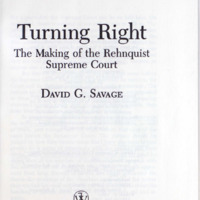-
Title
-
Turning right: the making of the Rehnquist Supreme Court.
-
Description
-
Account of the gradual shift of the Supreme Court to a conservative ideology.
-
Identifier
-
2481767
-
471536601
-
Creator
-
Savage, David G
-
Source
-
Brian Lamb Booknotes Collection
-
Gift of Brian Lamb, 2011.
-
Catalog record
-
Language
-
eng
-
Date
-
1992
-
Program air date: June 28, 1992.
-
Publisher
-
Wiley
-
George Mason University. Libraries. Special Collections & Archives
-
Subject
-
"Rehnquist, William H., 1924-2005."
-
"United States. Supreme Court."
-
Relation
-
Original Booknotes interview
-
Rights
-
This work may be protected by copyright laws and is provided for educational and research purposes only. Any infringing use may be subject to disciplinary action and/or civil or criminal liability as provided by law. If you believe that you are the rights-holder and object to Mason’s use of this image, please contact speccoll@gmu.edu.
-
Text
-
Transcription of Annotations
Notes on front endpapers: Chapter 3--78 pages--Brennan; First Street; How did Rehnquist/Bork/Scalia get their seats?; Scalia-56- affirmative action; Police game; Television 140; "Equal Justice under Law"-59; 62 Stevens--"kindest gentlest in the Bld"; How many justices have been clerks? 23 Scalia, Souter, O'Connor--women affect her vote; 338 White--fooled everyone again; Kennedy--Mr. Clean; Footnote manifesto--50 years (452); Where do clerks come from? 1. Convincing opinions; 2. Dissenting opinions; Scalia vs. O'Connor. Underlinings/notes: Relied on written work of the Court; interviews with justices/clerks--insisted not be cited by name. Warren G. Burger--17 year tenure--failure. 200th anniversary of the Constitution. Sandra Day O'Connor=80 percenter. Charles Cooper--clerked for William H. Rehnquist. Scalia conservative at 17; valedictorian at Georgetown. Needn't pay attention to public, power theirs for as long as they chose. Rehnquist's views flash frozen during younger days. 1985 interviewer asked if his thinking had evolved had changed--no, not since 1950s. 1953 finished clerkship, left Washington for Phoenix. By late 1950s Rehnquist saw Court as dangerously liberal. Became trusted legal adviser to state party chair Richard Kleindienst. Nixon brought Rehnquist in as head of the Office of Legal Counsel--not Nixon intimate. 1959 Rehnquist criticized the Senate in Harvard Law Review for failing to interrogate Supreme Court nominees on their basic philosophies. 10 Dec. 1971 confirmed 68-26 vote. Long sideburns, hair parted in the middle--brilliant eccentric--voice of the future. 24 cases argued each month--each justice 2-3 majority opinions per month. 100 new appeals per month. $30,000 for 25 page petition. 3% of appeals win a review. Long conference--no clerks, just justices--begin by shaking hands. Rehnquist--instant hit--moved through cases briskly. Honest. Nino Scalia despised affirmative action. Considered it racist, based on concepts of racial indebtedness/entitlement rather than worth and need. Court known for facade--Equal Justice Under Law. No match for Stevens' brains other than Scalia. Used two law clerks rather than norm of four. Rehnquist/Scalia appointments hadn't changed much on court. Bork nominated for US Court of Appeals in DC. Justices thought TV cheapened approval hearings. Rehnquist/Scalia/Bork played poker. Rehnquist liked to lunch with his law clerks. Anthony Kennedy--Mr. Clean. Tony Kennedy supported Gov. Reagan, met Meece--became youngest federal appeals court judge. Rehnquist/Scalia clash--Scalia seemed to believe only one possible right answer to cases--his. 1/3 of appeals sent tp court--from criminal cases. Stevens saw Rehnquist as knee-jerk conservative and Brennan and Marshall as knee-jerk liberals. Scalia took small case swept aside 30 years of precedent--pushed Rehnquist aside as conservative hero for younger generation--defense of free speech distinguished him from Rehnquist. O'Connor's balance irritated Scalia. Clerks for Brennan/Marshall knew witnessing final years of two legal legends. Ken Starr. 90 to 9 vote confirmed Souter as 105th justice of the Supreme Court. By 1991 five decades of consensus ended--prayer, schools, abortion. Transformed court no longer sees itself as protector of individual liberties/civil rights for minorities. 1972-1986--2 changes in court. Rehnquist Court--uphold will of majority, rules of government--not constitutional rights of individuals. 1st amendment--free speech/press=robust. America is a federation of states/communities; citizens set their own rules. No signs of returning to 1930s -style pro-business activism.
 2481767.pdf
2481767.pdf